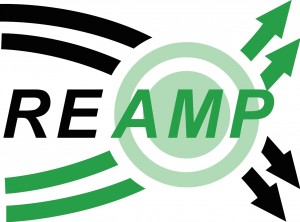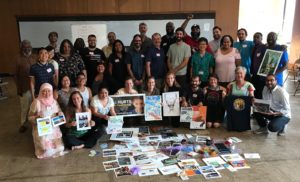Greetings RE-AMPers!
Happy August! We know summer isn’t slowing us or any of you down! In the Connections Connections section, learn about our newest member, Janet Pritchard, big updates coming to The Commons, and the State Carbon Pricing Network. Don’t pass up the Collective Strategy Collective Strategy section for recaps of the Energy Democracy Convening and the Academics & Advocates Convening as well as how to get involved in new and exciting Action Teams. Then, check out the Capacity Building Capacity Building to see what events are coming up around the Network and also how we are planning some of our first actions in shaping the narrative around climate change in the 2020 elections and how to get involved!
Have a story to share? Connect with Community Manager, Sarah Ann Shanahan today at sarah@reamp.org.
Connections
New Individual Member- Janet Pritchard
Janet recently attended our Annual Meeting and hosted an Open Space topic on securitization. After the meeting she applied for membership.
“I am an environmental lawyer with extensive experience in climate, bioenergy, and global deforestation issues. I developed this expertise during my tenure as Director of the Climate & Forests Program at ClientEarth, Europe’s leading environmental public interest law group (based in London, see https://www.clientearth.org) and subsequent consulting work. See www.linkedin.com/in/janetmeissnerpritchard.
I returned to Wisconsin, my home state, because I want to make a difference on climate issues here. I have spent 18 months working on watershed issues with the Southeastern Wisconsin Watershed Trust (aka ‘Sweet Water’) but I don’t feel that has been the best fit for me, and so, I am returning to consulting work. I hope to stay up to speed on relevant issues through RE-AMP and also to contribute to your groups and make professional connections.”
Her Network reference was Pam Ritger, Clean Wisconsin, who said, “I endorse Janet’s membership completely! She is incredibly thoughtful and knowledgeable, and getting engaged in all ways possible to reduce GHG emissions and fight climate change.”
If you’d like to connect with Janet you can reach her at jempritchard@hotmail.com.
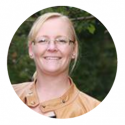 Improving our Online Collaborative Platform, The Commons
Improving our Online Collaborative Platform, The Commons
I’m excited to announce that we are updating our online collaborative platform, the Commons! For the most part it will feel very similar to our current site but some improvements you can expect to see include:
- Easy to use forums. The improved site will allow you to easily cut and paste text so that you don’t have to go back and add links or format your text. You’ll also be able to easily embed photos into any forum post.
- Groups that work for Action Teams and State Tables. We’ll now be able to include members and non-members in any group thanks to a new feature that will allow us to give access to non-members. They won’t have access to the full site but can submit a New User Request Form which will allow them to join a State Table or Action Team in which they are participating.
- Improved archiving. We’ll be streamlining the site by removing outdating materials and groups but don’t worry because through an improved archived section you’ll be able to find any past materials that you may need to reference!
- Access to the Network map. We’re going to put your unique sumapp link into your profile so it’s easy to find and use the Network’s social systems map.
- Streamlined tracking. With the implementation of a new database, CiviCRM, staff and members who track participation will find it easy to enter data and use it through the site.
We’re scheduled to complete work in mid to late September. As we get closer to wrapping up we’ll be hosting Network webinars to help familiarize you with the improved site. If you have any questions or have any ideas to share about how you want the site to work please reach out to Sarah Ann Shanahan at sarah@reamp.org.
State Carbon Pricing Network
Ruby Wincele, from Climate XChange, recently reached out to us to connect with others interested in state carbon pricing. Climate XChange is a nonprofit organization focused on providing research, education and advocacy tools to move us toward a low-carbon economy through market-based mechanisms.
The State Carbon Pricing Network is a network of more than 800 advocates in 25 states fighting to put a price on pollution. Many of their members are also part of The Nature Conservancy, League of Women Voters, Climate Reality Project, Sierra Club, and more.
Ruby is doing some research into carbon pricing efforts in the Midwest and is looking for opportunities to help grow the carbon pricing movement in the area. She wants to connect with key people, groups and legislators involved or interested in carbon pricing. If you’re interested in learning more or connecting with this Network please don’t hesitate to reach out to Ruby directly at rwincele@climate-xchange.org.
Collective Strategy
July 26-28, 2019
Detroit, MI
Hosted by: Soulardarity and made possible by Race Forward and The RE-AMP Network
Last month, we brought 40+ practitioners from all over the country together for the Energy Democracy Convening in Detroit, MI. Soulardarity hosted the gathering, highlighting our work on solar lighting and sustainable development in Highland Park. The gathering was a deep and powerful experience for many who attended. We asked deep questions about the needs of our movement: how will we dramatically scale up the solutions to climate change – and the systems of oppression which have given rise to it – with a diminishing timeline and scarce resources?
Over our few days together, we transformed that question. It was clear from the work represented at the table – and all the work and communities that weren’t – that the transition is already taking place. The agenda included deep relationship building, sharpening our analysis of the problems of the investor-monopoly driven energy system, and identifying shared problems and possible solutions. We also made space for some fun evening events connecting our national community to our local leaders.
The gathering was especially powerful because it was not hosted by one network or coalition, but a truly organic emergence of people seeking answers to these big questions. We left with intent to continue collaborating, aligning the national spaces we work in, and developing tools and resources to help energy democracy projects move forward despite the social, financial, and cultural barriers we face.
We are beyond honored to have hosted this convening of visionary, boots-on-the-ground, people-powered grassroots leaders for Energy Democracy! This movement is growing, and it’s black and brown and indigenous and working class communities driving it forward. We are claiming victory. We are claiming a just transition that stops climate change and repairs the harms wrought by monopoly capitalism, white supremacy, and the fossil fuel economy. From every corner of this country, and to allies across the globe, we are organizing to make this vision real.
The gathering was made possible in large part by Race Forward, and with critical seed funding from the RE-AMP Convening For Local Power Action Team.
Translating Across Boundaries: A Convening of Academics and Advocates on Climate Change
August 1-2, 2019
Hosted by: The RE-AMP Network Organizing Hub, the Energy Transition Lab, Brian Smith from the CURES Center at Wayne State University and Jodi Slick with Ecolibrium3
 Brian Smith, CURES Center at Wayne State (standing)
Brian Smith, CURES Center at Wayne State (standing)
As we know, climate change is a problem that requires us to know what the science says needs to happen while also understanding how to engage people and how to move policy forward. Translating Across Boundaries: A Convening of Academics and Advocates on Climate Change brought together two often siloed communities to explore collaborations that leverage the resources and expertise of research institutions with the knowledge of communities and real world impacts. The 45 attendees included executive directors of environmental organizations, college and university professors, field organizers, environmental justice leaders, community activists, graduate researchers, health professionals, and policy directors from eight states.
Some of the major themes that emerged over the two days included: solar and community-owned energy in indigenous communities; creating partnerships with communities and universities to do research collaboratively; developing solutions in rural areas; and exploring what work we need to be doing to reform utility shutoff policies. Coming out of the convening, there are three new RE-AMP Action Teams that are looking to form and nearly every attendee had a few people they were going to follow up with about research projects or developing strategies – one attendee in particular said he had a list of over 20 next steps with different people.
To find out more or connect with people from the convening reach out to RE-AMP Network Organizing Hub Director, Sean Carroll (sean@reamp.org).
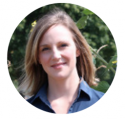 Update from the Steering Committee by Melissa Gavin, Chief Network Officer
Update from the Steering Committee by Melissa Gavin, Chief Network Officer
Due to busy summer travel, committee members and staff agreed to cancel July’s formal Steering Committee meeting. Instead, I distributed a detailed report and have included highlights for members below. The next Steering Committee call will be held at its normal time on the third Tuesday in August. In September, the Steering Committee will be meeting in-person in Minneapolis.
The RE-AMP Network continues to move forward with 2020 elections work and the goal established by the Steering Committee: “To shape the narrative during the 2020 election cycle to show candidates (particularly those running for local office, in strategically chosen races) that the Midwest demands an equitable elimination of greenhouse gas emissions by 2050.” At the same time, RE-AMP members and allies have been working on a national climate and equity platform, which is also aimed at shaping the narrative in the elections. The platform aligns with RE-AMP’s vision, values and equity statement and the RE-AMP Steering Committee will be exploring how the Network can support and boost the signal on the platform. Read the platform at https://ajustclimate.org/.
The RE-AMP task force to equitably decarbonize utilities is now formed! Nine members accepted the invitation to join. They are:
- Bob Blake (Minnesota Interfaith Power & Light)
- Courtney Hanson (People for Community Recovery)
- Robin Lisowski (Slipstream)
- Miguel Yanez (Environmental and Energy Study Institute)
- Nicole Donaghy (Dakota Resource Council)
- Uma Outka (Climate + Energy Project)
- Carolyn Berninger (Minnesota Center for Environmental Advocacy)
- Scott Blankman (Clean Wisconsin)
- Lisa Daniels (Windustry)
Sarah and Gail are organizing the first-ever events designed toward an external community, to share what RE-AMP has learned by thinking systemically and acting collaboratively. Two Network Thinking Academies will run concurrently in early December. One is for funders and one for practitioners.
Join the Reducing Vehicle Miles Traveled Action Team! 
We had a fantastic conversation at the Annual Meeting discussing strategies to reduce transportation-based greenhouse gas emissions. We are forming a Level One Action Team to scope out basic strategies and goals around reducing vehicle miles traveled (VMT) at the local level.
Transportation remains the nation’s number one source of greenhouse gas emissions. Nationwide, VMT continues to increase. In order to effectively combat climate change, we need to reduce the amount people are driving. This new Action Team will explore opportunities to reduce VMT at the local level. Initial ideas include providing resources, best practices, or tool kits to help cities and counties combat VMT and lower emissions.
Join us in the fight against transportation greenhouse gas emissions! We plan on starting the Action Team this summer. Email Gregg May at Gregg@1kfriends.org to be added to the list.
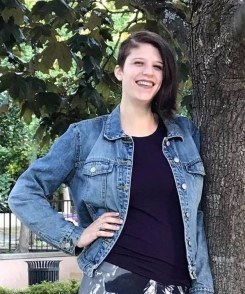 Join the Intersection of Water & Climate Action Team!
Join the Intersection of Water & Climate Action Team!
Members are exploring ideas that can simultaneously increase people’s access to clean water and can have meaningful impacts on reducing greenhouse gas emissions. To find out more contact Meredith Gillies at mgillies@cleanwater.org.
Funding Opportunity: Clean Energy and Energy Efficiency Rapid Response Fund
We are interested in supporting non-profit organizations that encounter unexpected needs or changed circumstances in the course of ongoing campaigns or multi-state initiatives. Grants from the fund will be prioritized for needs that require rapid turnaround. The fund is not intended to cover core operating budgets or to address shortfalls in annual fundraising efforts. The fund may only be used for non-lobbying expenses of 501(c)(3) organizations.
Key Areas of Interest
- Defend against emerging attempts to weaken or eliminate existing Energy Efficiency Resource Standards (EERS), Renewable Portfolio Standards (RPS) or other utility sector clean energy policies.
- Take advantage of unexpected opportunities to expand or strengthen those policies.
- Intervene in rate cases that present new opportunities to incentivize energy efficiency or renewable energy including vigorously opposing increases in fixed charges.
For more information go to the Commons —-> Activity ——> Funding—–> Rapid Response
Capacity Building
RE-AMP + 2020 Elections: Presidential Candidates Climate Change Town Hall
After receiving criticism for not focusing enough attention on climate change in the first 2020 Democratic presidential candidate debates, CNN announced last month that it would hold its own Climate Change Town Hall for qualifying candidates on September 4th in New York City. MSNBC followed suit by announcing its own Climate Change Forum hosted by Georgetown University and taking place on September 19-20.
Sean Carroll is currently organizing Network members who are interested to work together to identify an action we can take together, or at least explore what opportunities there are to help shape the narrative of these conversations with candidates (our agreed upon goal as RE-AMP’s 2020 elections work). Perhaps it’s submitting a question to the candidates, or coordinating around earned media, or us reaching out to our own respective members. Planning may already be underway when this newsletter is published, but interested individuals can always reach out to Sean at sean@reamp.org for more information on how to get involved!

RE-AMP Lunch & Learn Webinar Series #4: Equitable Energy Storage | July 2019 | Video Recording
Jeremy Richardson from the Union of Concerned Scientists, Celeste Flores from Faith in Place, and Gail Francis from RE-AMP discuss the background and importance of energy storage and the need for equity around this emerging and quickly expanding technology. They also talk about their development of the “Principles of Equitable Policy Design for Energy Storage” which brought together more than 25 organizations representing several RE-AMP member organizations and a wide variety of interests including environmental justice, energy, labor, consumer, faith, policy, and more. Slides can be viewed here.
Assessing Fairness to Enable Collaboration Webinar | July 2019 | Video Recording
This webinar will summarize new research into the role that perceptions of fairness play in enabling effective collaboration.
RE-AMP Lunch & Learn Webinar Series #5: Mapping Rural Communities | August 2019 | Video Recording

The Mapping Rural Communities Action Team presents their work and findings. The team shows how local communities are on the front line of both climate change and climate action. With inaction at the federal level as well in many states, local communities are often the place where real action starts.
In 2018, this team looked at what larger cities were already doing to address climate action. This year, they also wanted to look at what some smaller communities, many rural, were doing, as well as the drivers and what barriers were in place. Data collected through their work can give us an important peak into why communities are taking action, how to move more communities (both large and small) into action and how equity is currently being incorporated into the process and help us develop a comprehensive strategy for more broadly moving equitable climate action at the community level. Slides can be viewed here.
Equitable 100% Renewable Energy Webinar | August 26th
Steering Committee Meeting | August 20th
Level Two and Level Three Action Team Applications Due | August 30th
Steering Committee In-Person Meeting | September 16-17th
Equitably Decarbonizing Utilities Summit | November 14-15th
Network Thinking Academies | December 3-5th


